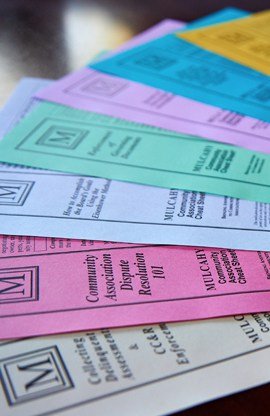January 8th, 2024, marked the opening of Arizona’s Fifty-Sixth Second Regular Legislative Session. News laws will become effective September 14, 2024.
SB1016 Homeowners’ Associations; Flagpoles
Applies to Planned Communities.
This Bill would allow an association to limit an owner to two wall mounted flagpole holders.
SB1432 Unlawful Restrictive Covenants; Uniform Act
Applies to Planned Communities.
This Bill would permit an owner of property subject to an unlawful restriction to submit an amendment to remove that restriction to the Recorder for Recordation in the Lands Records office of the County where the property is located. It permits an association to vote to remove an unlawful property restriction without a vote by the members of the association. A member or members of an association can request an unlawful restriction be removed. The association must act on that request no later than 90 days after receipt of the request.
The Bill includes forms for homeowners to use to request the amendment and specific language that Associations should include when making an amendment pursuant to (now) § 33-534. That language is as follows:
“This Amendment removes from this deed or other document affecting title to real property an unlawful restriction as defined in Section 33-532, Arizona Revised Statutes. This Amendment does not affect the validity or enforceability of a restriction that is not an unlawful restriction.”
HB2119 Homeowner’s Associations; Fees; Related Parties
Applies to Planned Communities and Condominiums.
Associations shall not charge a transfer fee for any conveyance between the below-listed parties but can charge service fees for the administration of association records authorized in a managing agent contract with the association:
- the transfer of title has only nominal actual consideration for the transfer of a residential property between husband and wife, parent and child, grandparent and grandchild and natural or adopted siblings.
- For no consideration or nominal consideration (ex: between subsidiary to parent or vice versa, among commonly controlled entities, from a member of an LLC to and LLC or vice versa, from a partner to its partnership (or vice versa), from a joint venturer to its joint venture (or vice versa), from a trust beneficiary to its trustee (or vice versa) or from any of these entities to a single purpose entity in order to obtain financing.
HB2141 Condominiums; Interior Improvements; Approvals
Applies to Condominiums.
This Bill states that regardless of what the association’s documents state, an association cannot prohibit a unit owner from making improvements or alterations to the unit in a way that may disturb adjacent unit occupants as long as the unit owner purchases and installs anything necessary to minimize or eliminate that disturbance.
The cost of any reasonably necessary improved materials, accessories or adjustments that mitigate disturbance to neighboring unit owners shall be born by the unit owner that is making the alterations.
The Association also shall not prohibit a unit owner from using any manner of decoration on the interior of the unit.
HB2662 Homeowners’ Associations; Meeting Agendas
This Bill would require the secretary to provide an agenda for any meeting of the unit owners’ association by hand delivery, mail, website posting, email or other electronic means or posting at a community center or other similar location.
Applies to Planned Communities and Condominiums.
HB2648 Condominiums; Planned communities; Lien; Assessment
Applies to Planned Communities and Condominiums.
An association board must exercise reasonable efforts to communicate with the owner and offer a reasonable payment by the owner prior to filing a foreclosure.
An association board must exercise reasonable efforts to communicate with the owner and offer a reasonable payment by the owner prior to filing a foreclosure.
No matter what an association’s documents state to the contrary, fees/charges (like self help or fees/charges charged for an owner’s damage to common areas), late fees and fines/penalties can be collected only via civil lawsuit and once a judgment is obtained in a civil lawsuit, it can be recorded to become a judgment lien. This judgment lien cannot be foreclosed, but it can be collected via garnishment or when the owner sells their lot/unit.
Associations need to apply payments made by owners without any direction as to how it should be applied in a certain manner.
HB2698 Planned Communities; Declarant Control
Applies to Planned Communities
Notwithstanding any provision in the community documents:
1. Each declaration that provides for a period of declarant control of the association shall also provide for a date of or method for calculating the date of the termination of declarant control.
2. For every planned community, without regard to whether the community documents provide for the termination of declarant control, declarant control terminates not later than the date on which the second to last lot in the planned community is conveyed to a buyer.
3. After termination of the period of declarant control and while the declarant owns one or more lots in the planned community, the association shall:
(a) Provide at least the same level maintenance of common areas that the declarant provided.
(b) Not impede the declarant’s ability to develop, construct and sell its lots and not impede access to and use of common areas by the declarant in the same manner as other members.

